Supporting Children's Development: Play and Pedagogy in Preschool
VerifiedAdded on 2022/11/11
|8
|1688
|125
Report
AI Summary
This report delves into the significance of play and pedagogy within pre-school settings, specifically focusing on the role of block learning centers in fostering holistic child development. It examines how these centers contribute to children's social and emotional, intellectual, and physical growth. The report highlights the crucial role of educators in promoting learning through communication, guidance, and creating appropriate learning environments. Furthermore, it explores the importance of a structured temporal environment, including schedules and routines, in providing children with a sense of security, predictability, and opportunities for learning. The report emphasizes the benefits of play-based learning, the educator's role in facilitating this process, and the impact of a well-planned temporal environment on children's overall development. The assignment follows APA referencing style and is based on governmental references.
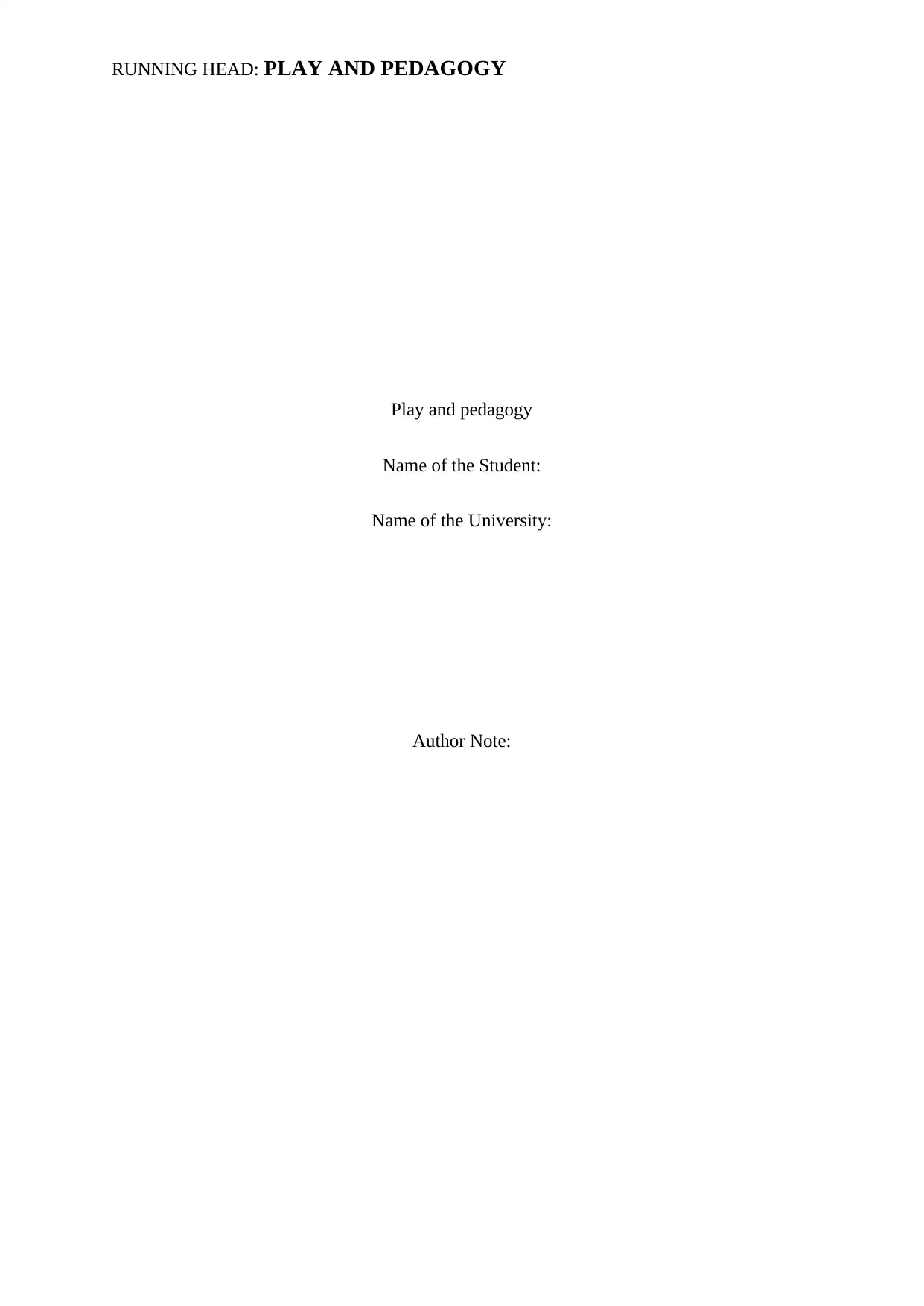
RUNNING HEAD: PLAY AND PEDAGOGY
Play and pedagogy
Name of the Student:
Name of the University:
Author Note:
Play and pedagogy
Name of the Student:
Name of the University:
Author Note:
Paraphrase This Document
Need a fresh take? Get an instant paraphrase of this document with our AI Paraphraser
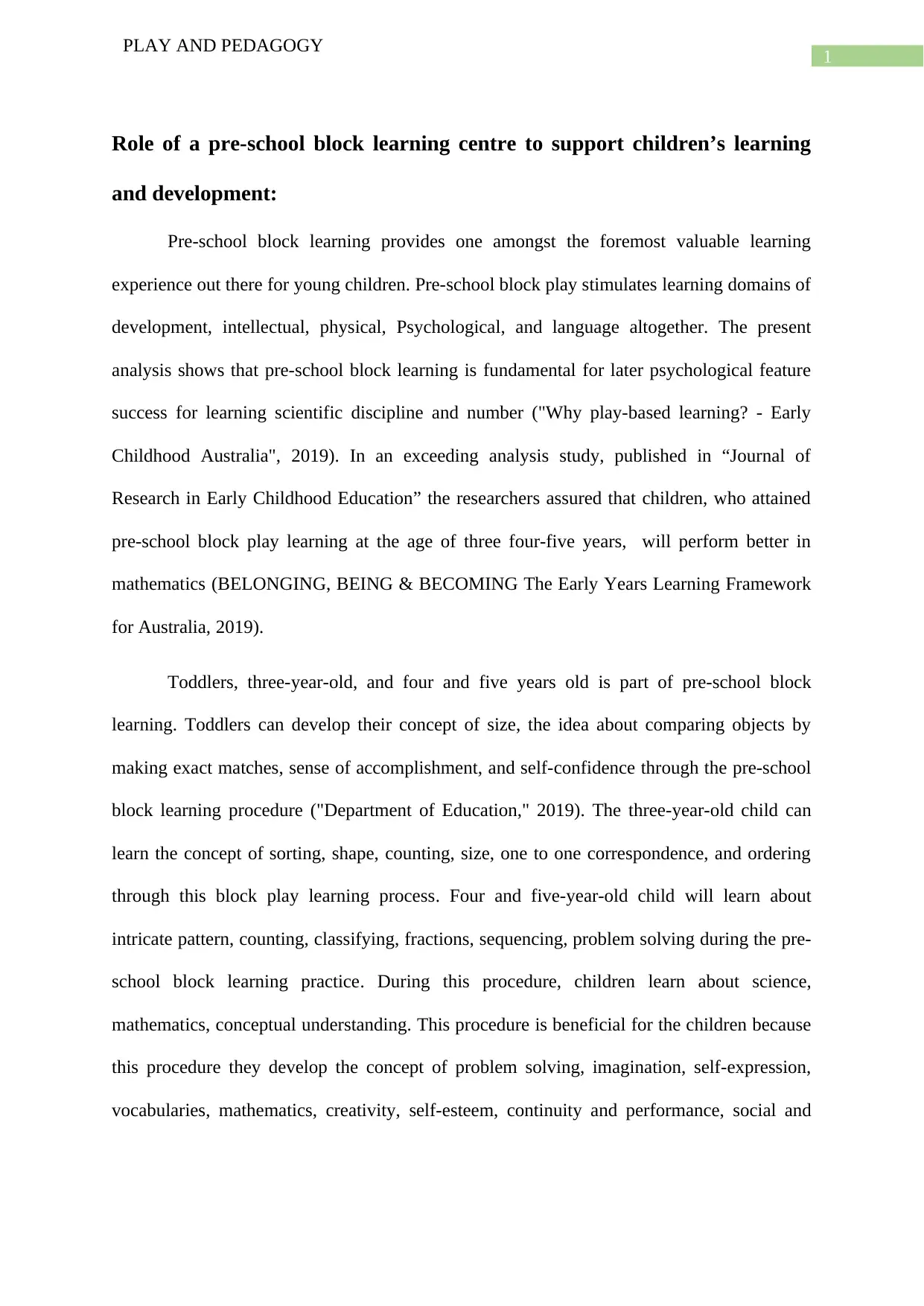
1
PLAY AND PEDAGOGY
Role of a pre-school block learning centre to support children’s learning
and development:
Pre-school block learning provides one amongst the foremost valuable learning
experience out there for young children. Pre-school block play stimulates learning domains of
development, intellectual, physical, Psychological, and language altogether. The present
analysis shows that pre-school block learning is fundamental for later psychological feature
success for learning scientific discipline and number ("Why play-based learning? - Early
Childhood Australia", 2019). In an exceeding analysis study, published in “Journal of
Research in Early Childhood Education” the researchers assured that children, who attained
pre-school block play learning at the age of three four-five years, will perform better in
mathematics (BELONGING, BEING & BECOMING The Early Years Learning Framework
for Australia, 2019).
Toddlers, three-year-old, and four and five years old is part of pre-school block
learning. Toddlers can develop their concept of size, the idea about comparing objects by
making exact matches, sense of accomplishment, and self-confidence through the pre-school
block learning procedure ("Department of Education," 2019). The three-year-old child can
learn the concept of sorting, shape, counting, size, one to one correspondence, and ordering
through this block play learning process. Four and five-year-old child will learn about
intricate pattern, counting, classifying, fractions, sequencing, problem solving during the pre-
school block learning practice. During this procedure, children learn about science,
mathematics, conceptual understanding. This procedure is beneficial for the children because
this procedure they develop the concept of problem solving, imagination, self-expression,
vocabularies, mathematics, creativity, self-esteem, continuity and performance, social and
PLAY AND PEDAGOGY
Role of a pre-school block learning centre to support children’s learning
and development:
Pre-school block learning provides one amongst the foremost valuable learning
experience out there for young children. Pre-school block play stimulates learning domains of
development, intellectual, physical, Psychological, and language altogether. The present
analysis shows that pre-school block learning is fundamental for later psychological feature
success for learning scientific discipline and number ("Why play-based learning? - Early
Childhood Australia", 2019). In an exceeding analysis study, published in “Journal of
Research in Early Childhood Education” the researchers assured that children, who attained
pre-school block play learning at the age of three four-five years, will perform better in
mathematics (BELONGING, BEING & BECOMING The Early Years Learning Framework
for Australia, 2019).
Toddlers, three-year-old, and four and five years old is part of pre-school block
learning. Toddlers can develop their concept of size, the idea about comparing objects by
making exact matches, sense of accomplishment, and self-confidence through the pre-school
block learning procedure ("Department of Education," 2019). The three-year-old child can
learn the concept of sorting, shape, counting, size, one to one correspondence, and ordering
through this block play learning process. Four and five-year-old child will learn about
intricate pattern, counting, classifying, fractions, sequencing, problem solving during the pre-
school block learning practice. During this procedure, children learn about science,
mathematics, conceptual understanding. This procedure is beneficial for the children because
this procedure they develop the concept of problem solving, imagination, self-expression,
vocabularies, mathematics, creativity, self-esteem, continuity and performance, social and
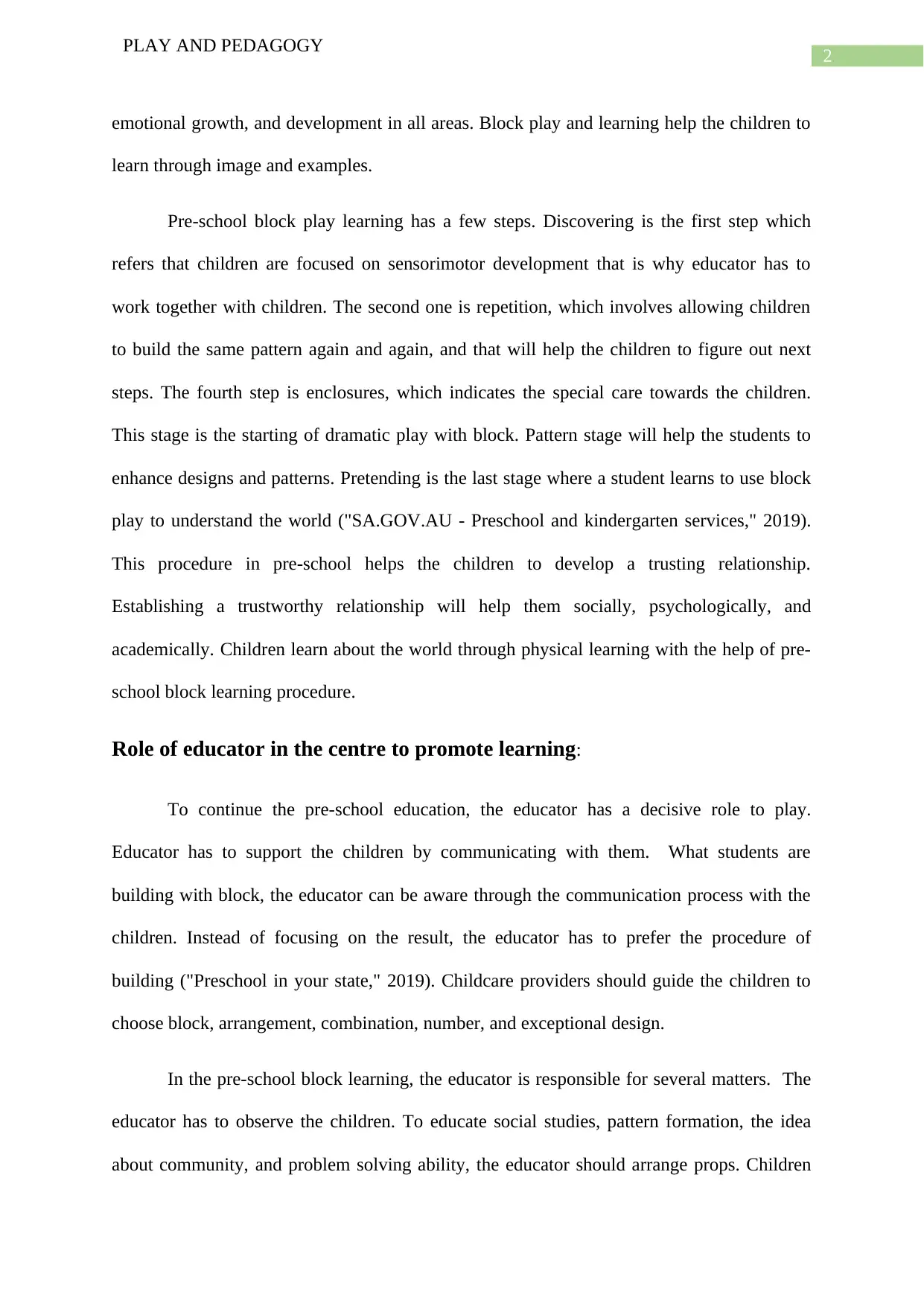
2
PLAY AND PEDAGOGY
emotional growth, and development in all areas. Block play and learning help the children to
learn through image and examples.
Pre-school block play learning has a few steps. Discovering is the first step which
refers that children are focused on sensorimotor development that is why educator has to
work together with children. The second one is repetition, which involves allowing children
to build the same pattern again and again, and that will help the children to figure out next
steps. The fourth step is enclosures, which indicates the special care towards the children.
This stage is the starting of dramatic play with block. Pattern stage will help the students to
enhance designs and patterns. Pretending is the last stage where a student learns to use block
play to understand the world ("SA.GOV.AU - Preschool and kindergarten services," 2019).
This procedure in pre-school helps the children to develop a trusting relationship.
Establishing a trustworthy relationship will help them socially, psychologically, and
academically. Children learn about the world through physical learning with the help of pre-
school block learning procedure.
Role of educator in the centre to promote learning:
To continue the pre-school education, the educator has a decisive role to play.
Educator has to support the children by communicating with them. What students are
building with block, the educator can be aware through the communication process with the
children. Instead of focusing on the result, the educator has to prefer the procedure of
building ("Preschool in your state," 2019). Childcare providers should guide the children to
choose block, arrangement, combination, number, and exceptional design.
In the pre-school block learning, the educator is responsible for several matters. The
educator has to observe the children. To educate social studies, pattern formation, the idea
about community, and problem solving ability, the educator should arrange props. Children
PLAY AND PEDAGOGY
emotional growth, and development in all areas. Block play and learning help the children to
learn through image and examples.
Pre-school block play learning has a few steps. Discovering is the first step which
refers that children are focused on sensorimotor development that is why educator has to
work together with children. The second one is repetition, which involves allowing children
to build the same pattern again and again, and that will help the children to figure out next
steps. The fourth step is enclosures, which indicates the special care towards the children.
This stage is the starting of dramatic play with block. Pattern stage will help the students to
enhance designs and patterns. Pretending is the last stage where a student learns to use block
play to understand the world ("SA.GOV.AU - Preschool and kindergarten services," 2019).
This procedure in pre-school helps the children to develop a trusting relationship.
Establishing a trustworthy relationship will help them socially, psychologically, and
academically. Children learn about the world through physical learning with the help of pre-
school block learning procedure.
Role of educator in the centre to promote learning:
To continue the pre-school education, the educator has a decisive role to play.
Educator has to support the children by communicating with them. What students are
building with block, the educator can be aware through the communication process with the
children. Instead of focusing on the result, the educator has to prefer the procedure of
building ("Preschool in your state," 2019). Childcare providers should guide the children to
choose block, arrangement, combination, number, and exceptional design.
In the pre-school block learning, the educator is responsible for several matters. The
educator has to observe the children. To educate social studies, pattern formation, the idea
about community, and problem solving ability, the educator should arrange props. Children
⊘ This is a preview!⊘
Do you want full access?
Subscribe today to unlock all pages.

Trusted by 1+ million students worldwide
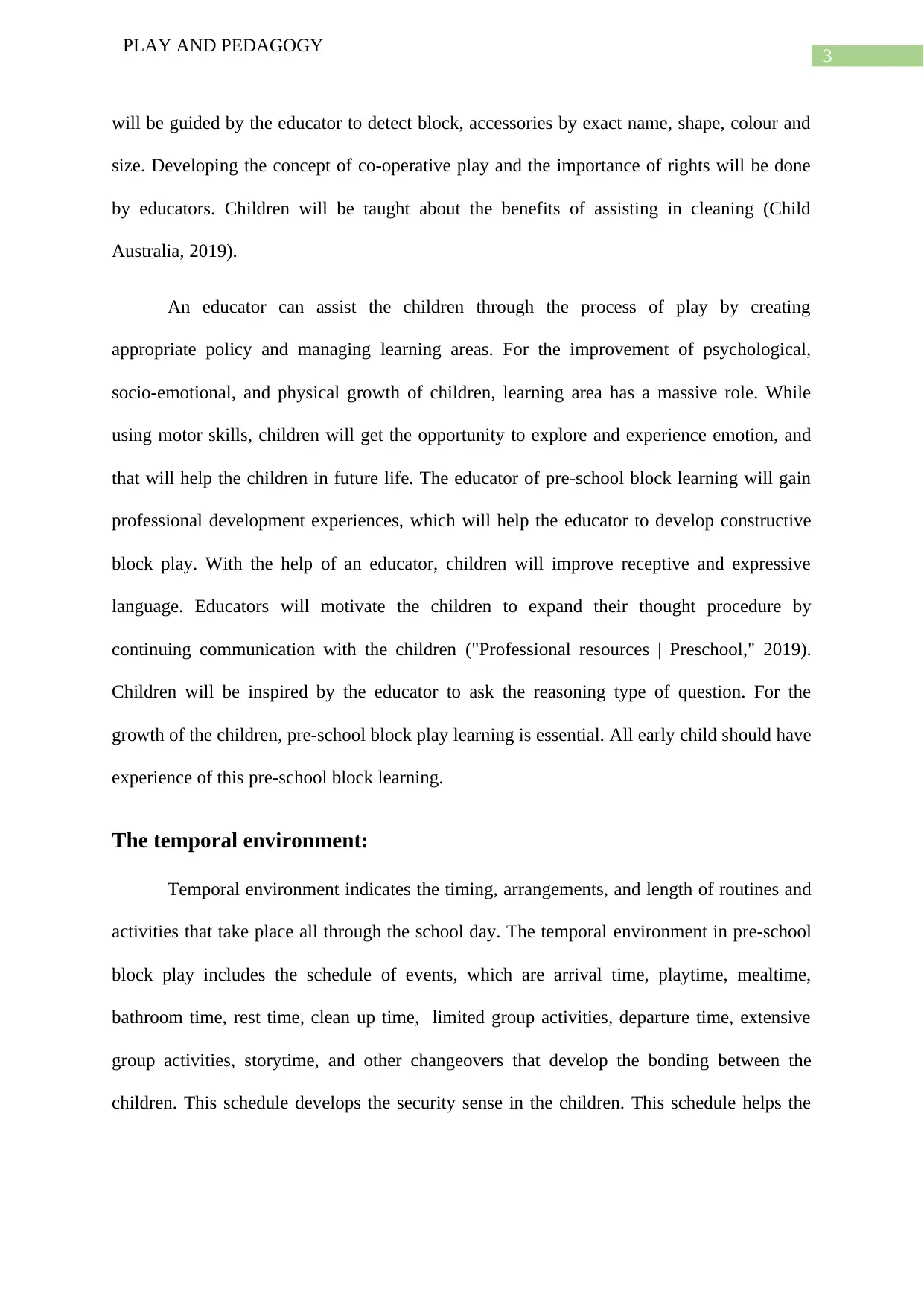
3
PLAY AND PEDAGOGY
will be guided by the educator to detect block, accessories by exact name, shape, colour and
size. Developing the concept of co-operative play and the importance of rights will be done
by educators. Children will be taught about the benefits of assisting in cleaning (Child
Australia, 2019).
An educator can assist the children through the process of play by creating
appropriate policy and managing learning areas. For the improvement of psychological,
socio-emotional, and physical growth of children, learning area has a massive role. While
using motor skills, children will get the opportunity to explore and experience emotion, and
that will help the children in future life. The educator of pre-school block learning will gain
professional development experiences, which will help the educator to develop constructive
block play. With the help of an educator, children will improve receptive and expressive
language. Educators will motivate the children to expand their thought procedure by
continuing communication with the children ("Professional resources | Preschool," 2019).
Children will be inspired by the educator to ask the reasoning type of question. For the
growth of the children, pre-school block play learning is essential. All early child should have
experience of this pre-school block learning.
The temporal environment:
Temporal environment indicates the timing, arrangements, and length of routines and
activities that take place all through the school day. The temporal environment in pre-school
block play includes the schedule of events, which are arrival time, playtime, mealtime,
bathroom time, rest time, clean up time, limited group activities, departure time, extensive
group activities, storytime, and other changeovers that develop the bonding between the
children. This schedule develops the security sense in the children. This schedule helps the
PLAY AND PEDAGOGY
will be guided by the educator to detect block, accessories by exact name, shape, colour and
size. Developing the concept of co-operative play and the importance of rights will be done
by educators. Children will be taught about the benefits of assisting in cleaning (Child
Australia, 2019).
An educator can assist the children through the process of play by creating
appropriate policy and managing learning areas. For the improvement of psychological,
socio-emotional, and physical growth of children, learning area has a massive role. While
using motor skills, children will get the opportunity to explore and experience emotion, and
that will help the children in future life. The educator of pre-school block learning will gain
professional development experiences, which will help the educator to develop constructive
block play. With the help of an educator, children will improve receptive and expressive
language. Educators will motivate the children to expand their thought procedure by
continuing communication with the children ("Professional resources | Preschool," 2019).
Children will be inspired by the educator to ask the reasoning type of question. For the
growth of the children, pre-school block play learning is essential. All early child should have
experience of this pre-school block learning.
The temporal environment:
Temporal environment indicates the timing, arrangements, and length of routines and
activities that take place all through the school day. The temporal environment in pre-school
block play includes the schedule of events, which are arrival time, playtime, mealtime,
bathroom time, rest time, clean up time, limited group activities, departure time, extensive
group activities, storytime, and other changeovers that develop the bonding between the
children. This schedule develops the security sense in the children. This schedule helps the
Paraphrase This Document
Need a fresh take? Get an instant paraphrase of this document with our AI Paraphraser
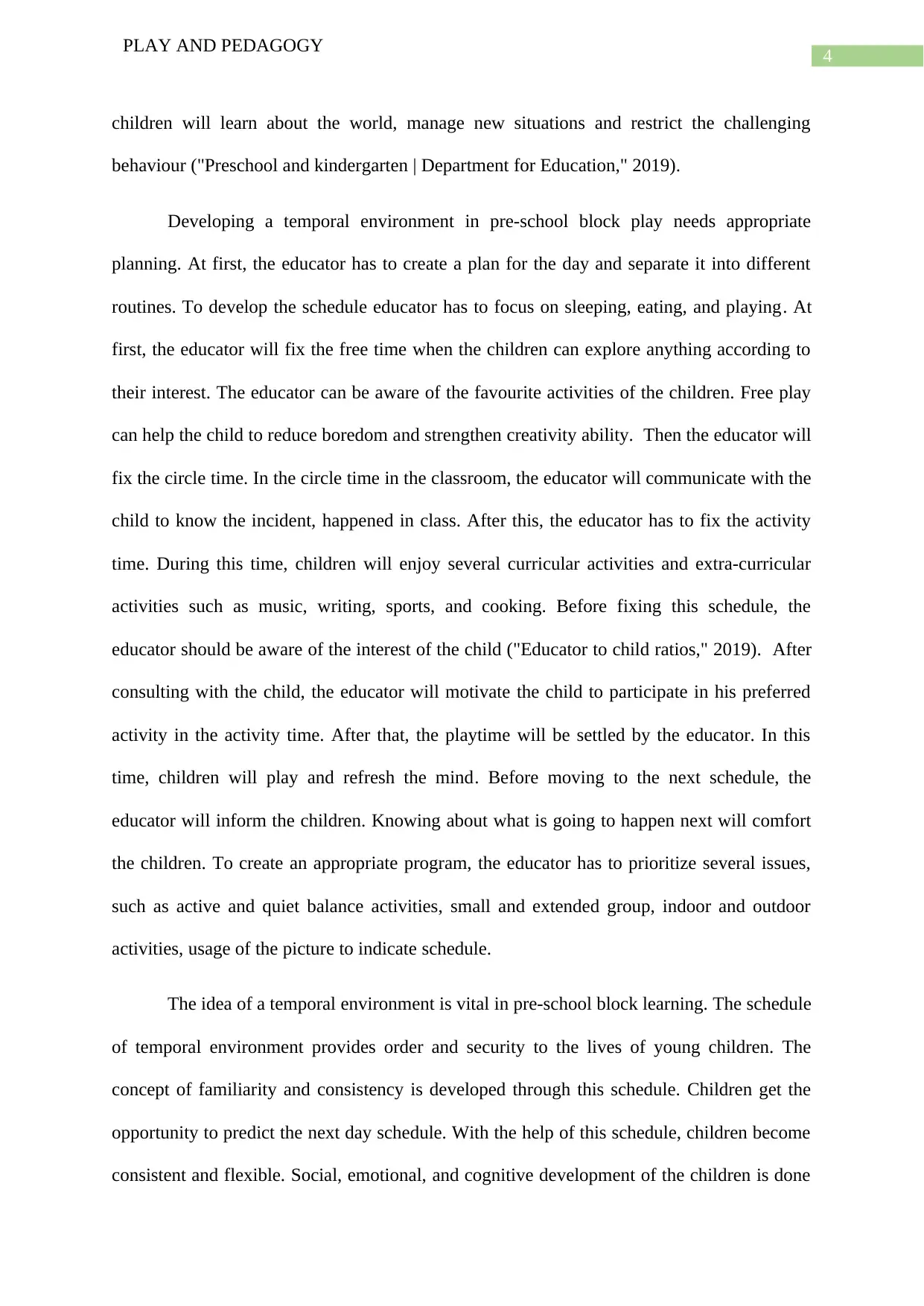
4
PLAY AND PEDAGOGY
children will learn about the world, manage new situations and restrict the challenging
behaviour ("Preschool and kindergarten | Department for Education," 2019).
Developing a temporal environment in pre-school block play needs appropriate
planning. At first, the educator has to create a plan for the day and separate it into different
routines. To develop the schedule educator has to focus on sleeping, eating, and playing. At
first, the educator will fix the free time when the children can explore anything according to
their interest. The educator can be aware of the favourite activities of the children. Free play
can help the child to reduce boredom and strengthen creativity ability. Then the educator will
fix the circle time. In the circle time in the classroom, the educator will communicate with the
child to know the incident, happened in class. After this, the educator has to fix the activity
time. During this time, children will enjoy several curricular activities and extra-curricular
activities such as music, writing, sports, and cooking. Before fixing this schedule, the
educator should be aware of the interest of the child ("Educator to child ratios," 2019). After
consulting with the child, the educator will motivate the child to participate in his preferred
activity in the activity time. After that, the playtime will be settled by the educator. In this
time, children will play and refresh the mind. Before moving to the next schedule, the
educator will inform the children. Knowing about what is going to happen next will comfort
the children. To create an appropriate program, the educator has to prioritize several issues,
such as active and quiet balance activities, small and extended group, indoor and outdoor
activities, usage of the picture to indicate schedule.
The idea of a temporal environment is vital in pre-school block learning. The schedule
of temporal environment provides order and security to the lives of young children. The
concept of familiarity and consistency is developed through this schedule. Children get the
opportunity to predict the next day schedule. With the help of this schedule, children become
consistent and flexible. Social, emotional, and cognitive development of the children is done
PLAY AND PEDAGOGY
children will learn about the world, manage new situations and restrict the challenging
behaviour ("Preschool and kindergarten | Department for Education," 2019).
Developing a temporal environment in pre-school block play needs appropriate
planning. At first, the educator has to create a plan for the day and separate it into different
routines. To develop the schedule educator has to focus on sleeping, eating, and playing. At
first, the educator will fix the free time when the children can explore anything according to
their interest. The educator can be aware of the favourite activities of the children. Free play
can help the child to reduce boredom and strengthen creativity ability. Then the educator will
fix the circle time. In the circle time in the classroom, the educator will communicate with the
child to know the incident, happened in class. After this, the educator has to fix the activity
time. During this time, children will enjoy several curricular activities and extra-curricular
activities such as music, writing, sports, and cooking. Before fixing this schedule, the
educator should be aware of the interest of the child ("Educator to child ratios," 2019). After
consulting with the child, the educator will motivate the child to participate in his preferred
activity in the activity time. After that, the playtime will be settled by the educator. In this
time, children will play and refresh the mind. Before moving to the next schedule, the
educator will inform the children. Knowing about what is going to happen next will comfort
the children. To create an appropriate program, the educator has to prioritize several issues,
such as active and quiet balance activities, small and extended group, indoor and outdoor
activities, usage of the picture to indicate schedule.
The idea of a temporal environment is vital in pre-school block learning. The schedule
of temporal environment provides order and security to the lives of young children. The
concept of familiarity and consistency is developed through this schedule. Children get the
opportunity to predict the next day schedule. With the help of this schedule, children become
consistent and flexible. Social, emotional, and cognitive development of the children is done
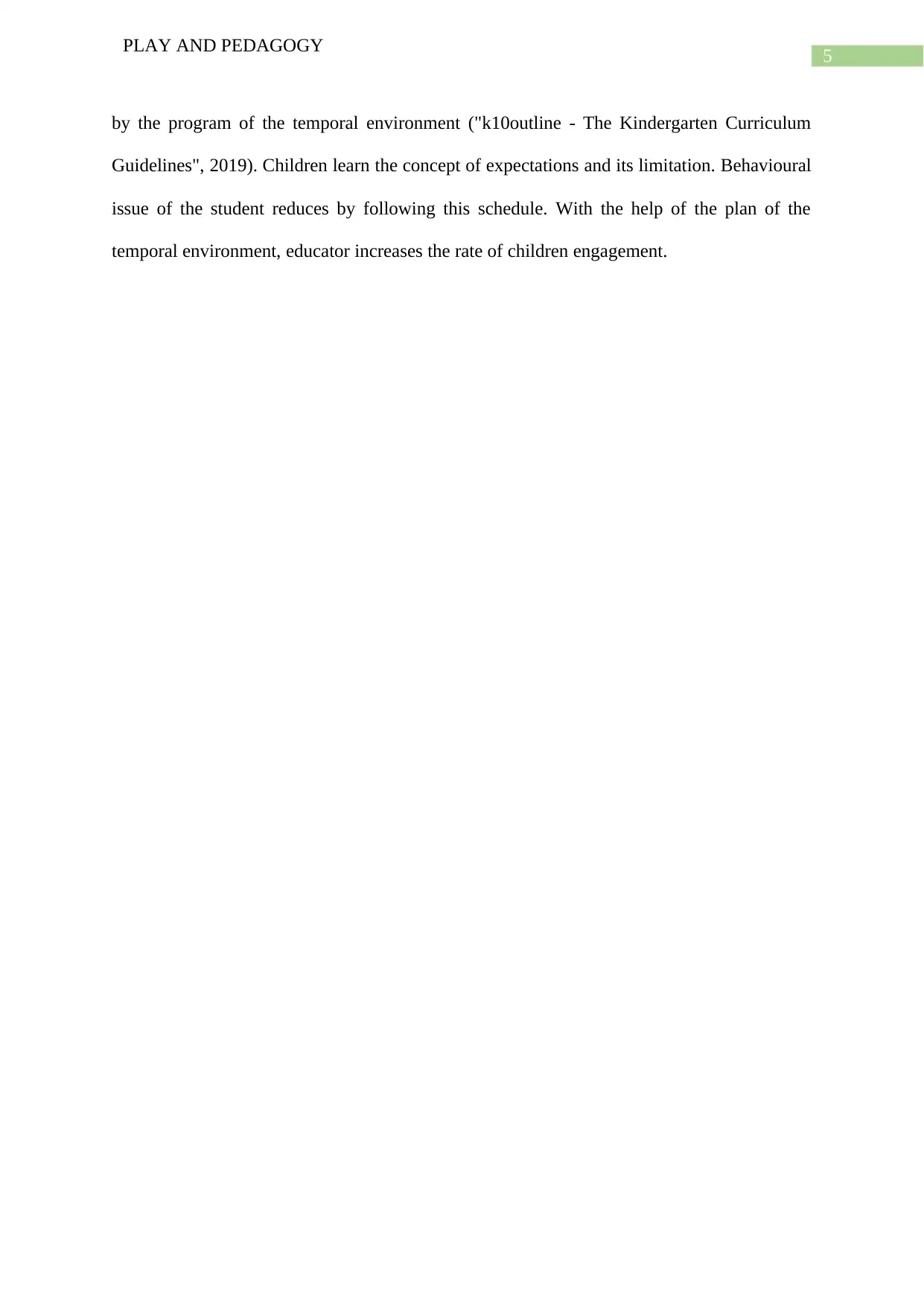
5
PLAY AND PEDAGOGY
by the program of the temporal environment ("k10outline - The Kindergarten Curriculum
Guidelines", 2019). Children learn the concept of expectations and its limitation. Behavioural
issue of the student reduces by following this schedule. With the help of the plan of the
temporal environment, educator increases the rate of children engagement.
PLAY AND PEDAGOGY
by the program of the temporal environment ("k10outline - The Kindergarten Curriculum
Guidelines", 2019). Children learn the concept of expectations and its limitation. Behavioural
issue of the student reduces by following this schedule. With the help of the plan of the
temporal environment, educator increases the rate of children engagement.
⊘ This is a preview!⊘
Do you want full access?
Subscribe today to unlock all pages.

Trusted by 1+ million students worldwide
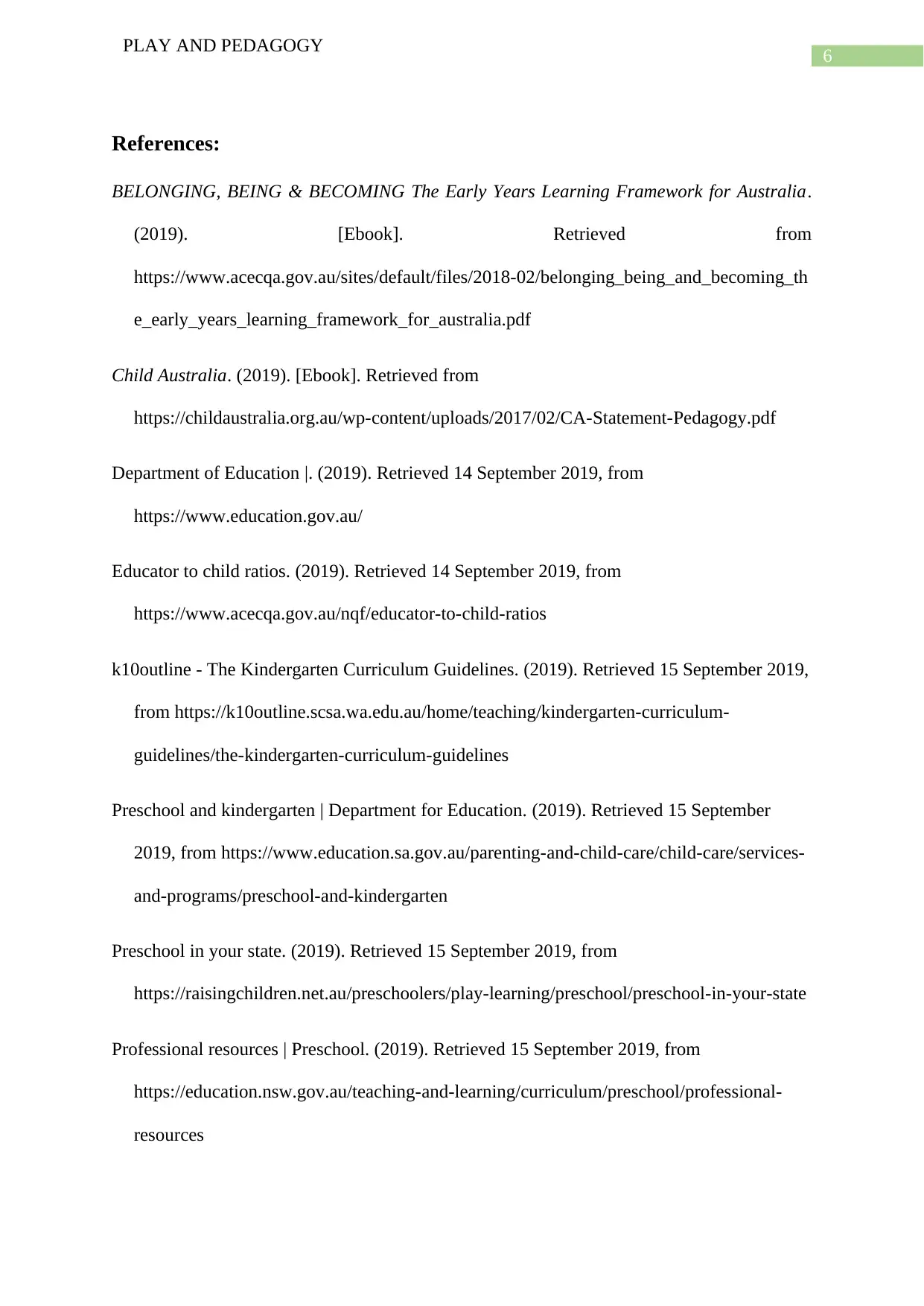
6
PLAY AND PEDAGOGY
References:
BELONGING, BEING & BECOMING The Early Years Learning Framework for Australia.
(2019). [Ebook]. Retrieved from
https://www.acecqa.gov.au/sites/default/files/2018-02/belonging_being_and_becoming_th
e_early_years_learning_framework_for_australia.pdf
Child Australia. (2019). [Ebook]. Retrieved from
https://childaustralia.org.au/wp-content/uploads/2017/02/CA-Statement-Pedagogy.pdf
Department of Education |. (2019). Retrieved 14 September 2019, from
https://www.education.gov.au/
Educator to child ratios. (2019). Retrieved 14 September 2019, from
https://www.acecqa.gov.au/nqf/educator-to-child-ratios
k10outline - The Kindergarten Curriculum Guidelines. (2019). Retrieved 15 September 2019,
from https://k10outline.scsa.wa.edu.au/home/teaching/kindergarten-curriculum-
guidelines/the-kindergarten-curriculum-guidelines
Preschool and kindergarten | Department for Education. (2019). Retrieved 15 September
2019, from https://www.education.sa.gov.au/parenting-and-child-care/child-care/services-
and-programs/preschool-and-kindergarten
Preschool in your state. (2019). Retrieved 15 September 2019, from
https://raisingchildren.net.au/preschoolers/play-learning/preschool/preschool-in-your-state
Professional resources | Preschool. (2019). Retrieved 15 September 2019, from
https://education.nsw.gov.au/teaching-and-learning/curriculum/preschool/professional-
resources
PLAY AND PEDAGOGY
References:
BELONGING, BEING & BECOMING The Early Years Learning Framework for Australia.
(2019). [Ebook]. Retrieved from
https://www.acecqa.gov.au/sites/default/files/2018-02/belonging_being_and_becoming_th
e_early_years_learning_framework_for_australia.pdf
Child Australia. (2019). [Ebook]. Retrieved from
https://childaustralia.org.au/wp-content/uploads/2017/02/CA-Statement-Pedagogy.pdf
Department of Education |. (2019). Retrieved 14 September 2019, from
https://www.education.gov.au/
Educator to child ratios. (2019). Retrieved 14 September 2019, from
https://www.acecqa.gov.au/nqf/educator-to-child-ratios
k10outline - The Kindergarten Curriculum Guidelines. (2019). Retrieved 15 September 2019,
from https://k10outline.scsa.wa.edu.au/home/teaching/kindergarten-curriculum-
guidelines/the-kindergarten-curriculum-guidelines
Preschool and kindergarten | Department for Education. (2019). Retrieved 15 September
2019, from https://www.education.sa.gov.au/parenting-and-child-care/child-care/services-
and-programs/preschool-and-kindergarten
Preschool in your state. (2019). Retrieved 15 September 2019, from
https://raisingchildren.net.au/preschoolers/play-learning/preschool/preschool-in-your-state
Professional resources | Preschool. (2019). Retrieved 15 September 2019, from
https://education.nsw.gov.au/teaching-and-learning/curriculum/preschool/professional-
resources
Paraphrase This Document
Need a fresh take? Get an instant paraphrase of this document with our AI Paraphraser
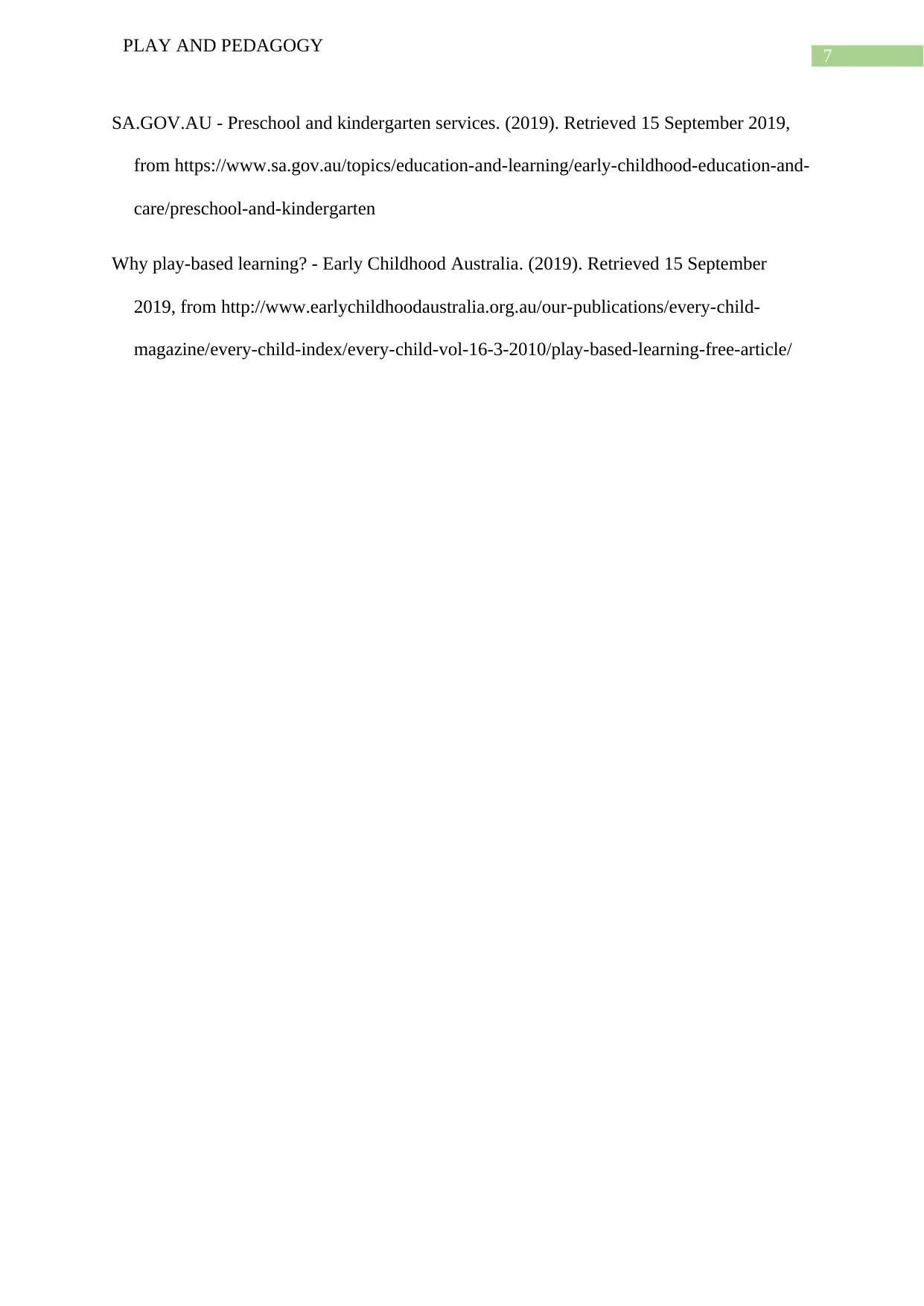
7
PLAY AND PEDAGOGY
SA.GOV.AU - Preschool and kindergarten services. (2019). Retrieved 15 September 2019,
from https://www.sa.gov.au/topics/education-and-learning/early-childhood-education-and-
care/preschool-and-kindergarten
Why play-based learning? - Early Childhood Australia. (2019). Retrieved 15 September
2019, from http://www.earlychildhoodaustralia.org.au/our-publications/every-child-
magazine/every-child-index/every-child-vol-16-3-2010/play-based-learning-free-article/
PLAY AND PEDAGOGY
SA.GOV.AU - Preschool and kindergarten services. (2019). Retrieved 15 September 2019,
from https://www.sa.gov.au/topics/education-and-learning/early-childhood-education-and-
care/preschool-and-kindergarten
Why play-based learning? - Early Childhood Australia. (2019). Retrieved 15 September
2019, from http://www.earlychildhoodaustralia.org.au/our-publications/every-child-
magazine/every-child-index/every-child-vol-16-3-2010/play-based-learning-free-article/
1 out of 8
Related Documents
Your All-in-One AI-Powered Toolkit for Academic Success.
+13062052269
info@desklib.com
Available 24*7 on WhatsApp / Email
![[object Object]](/_next/static/media/star-bottom.7253800d.svg)
Unlock your academic potential
Copyright © 2020–2026 A2Z Services. All Rights Reserved. Developed and managed by ZUCOL.




